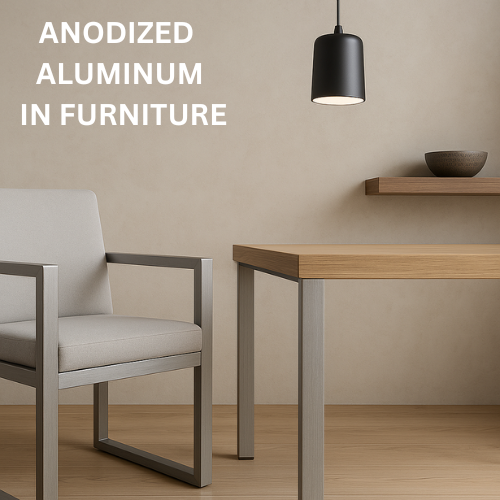As design trends shift toward minimalist, modern, and sustainable aesthetics, the materials used in furniture and furnishings are evolving too. Among these, anodized aluminum has emerged as a frontrunner in both functionality and visual appeal. Known for its durability, corrosion resistance, and sleek metallic finish, anodized aluminum is now widely used in home furniture, commercial interiors, and even artistic home décor.
In this blog, we’ll explore the applications, benefits, and growing demand for anodized aluminum in the furniture industry. We’ll also touch on its uses across other industries — from cookware to electronics — demonstrating how versatile and essential this material has become.
Anodized Aluminum in Furniture Design
Anodized aluminum is a preferred material in modern furniture manufacturing due to its strength, lightweight nature, and aesthetic adaptability. Whether it’s office chairs, tabletops, drawer handles, bed frames, or shelving systems, anodized aluminum offers a sleek yet rugged finish that maintains its quality for years.
Benefits in Furniture:
- Scratch-resistant surfaces – perfect for high-contact areas.
- Fade-resistant colors – ideal for outdoor and indoor furniture.
- Low maintenance – easy to clean and maintain.
- Sustainable choice – aluminum is 100% recyclable and the anodizing process is eco-friendly.
These benefits make it ideal for high-end furniture as well as cost-efficient, mass-produced furnishing solutions.
Home Décor Applications
In home interiors, anodized aluminum is used for decorative panels, curtain rails, wall trims, light fixtures, and modern minimalistic accents. Its ability to be color anodized — from matte black to champagne gold — allows homeowners and interior designers to match it with diverse palettes.
The metallic finish also complements glass, wood, and composite materials, making it ideal for contemporary and luxury home décor.
Electronics Industry
Anodized aluminum is widely used in electronics casings, such as for laptops, tablets, smartphones, and audio equipment. Its non-conductive anodized layer provides:
- Protection from electrical interference
- Heat dissipation
- Resistance to fingerprints and corrosion
This not only boosts product lifespan but also supports compact, lightweight design essential in modern electronics.
Cookware & Kitchen Appliances
Aluminum cookware often goes through anodizing to increase its strength and make it non-reactive with food. Hard-anodized aluminum pans, pots, and pressure cookers are common in both domestic and commercial kitchens.
Benefits in cookware:
- Non-toxic and non-stick surface
- Even heat distribution
- Enhanced durability without warping
Anodized aluminum also features in appliance housing such as ovens, mixers, and blenders, offering both aesthetics and heat resistance.
Toys & Play Equipment
Yes — even toys benefit from anodizing. Aluminum parts in ride-ons, scooters, learning tools, and STEM kits are anodized to make them safer and more durable. The non-toxic anodized layer ensures the aluminum doesn’t corrode or release particles, making it child-safe and long-lasting.
Musical Instruments
Guitars, keyboard stands, drum hardware, and DJ equipment often feature anodized aluminum parts. These parts benefit from:
- Anti-corrosion protection from sweat and moisture
- Vibrational stability
- Stylish finishes that reflect stage lighting well
This has made anodized aluminum a backstage favorite in both performance and production setups.
Environmental Advantages
Sustainability is a key selling point of anodized aluminum:
- It is 100% recyclable
- The anodizing process creates a long-lasting surface that reduces the need for replacements
- No volatile organic compounds (VOCs) are emitted during the process
Furniture manufacturers seeking green certifications or targeting eco-conscious buyers often lean into anodized aluminum for this very reason.
Final Thoughts
Anodized aluminum is far more than just a shiny surface. It plays a critical role in reshaping how industries approach durability, aesthetics, and sustainability. From sleek furniture and stylish lighting to hard-wearing cookware and precision musical instruments, anodized aluminum enhances both function and form.
Its combination of beauty, strength, and recyclability makes it a staple in modern manufacturing — especially for industries looking to innovate without compromising environmental ethics.
FREQUENTLY ASKED QUESTIONS – FAQs
1. How can I get in touch with your team for Anodizing requirements?
You can contact us directly by emailing corporatecommunications@growel.com. Our team will be happy to assist you with your specific requirements, technical questions, or service inquiries.
2. Is there any inquiry form that I need to fill out?
Please visit our Anodizing Solutions page. Scroll to the bottom of the page — you’ll find a simple inquiry form there. Kindly fill it out, and our team will contact you shortly to assist with your requirements.
3. Is there a support email if I have questions about the website or technical issues?
Yes! For any queries related to Anodizing, please reach out to corporatecommunications@growel.com. We’ll ensure your query is resolved promptly.



